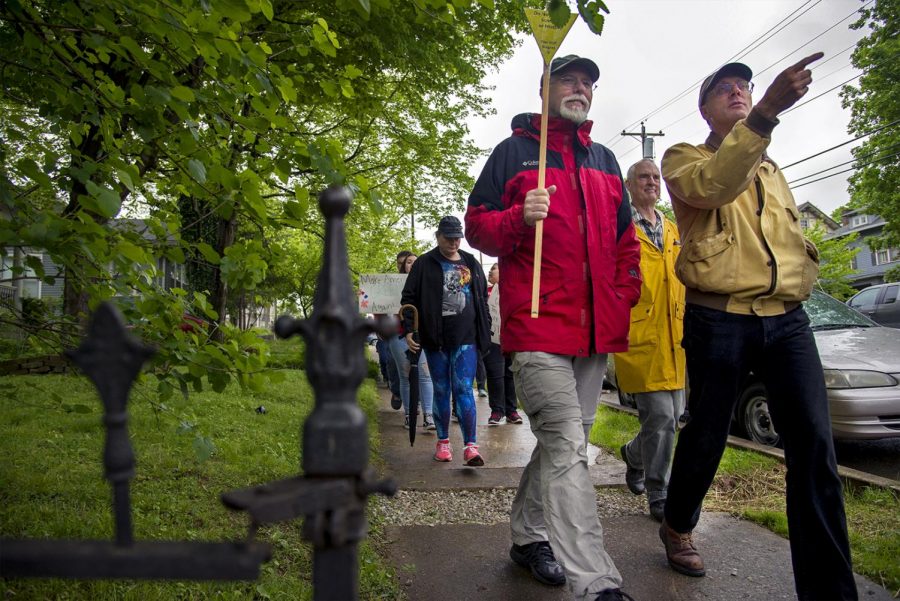Marchers join national campaign to support science
April 24, 2017
Rain did not deter marchers who showed up in Bowling Green Saturday afternoon to show their support for science and funding as a part of the international March for Science.
According to the March for Science website, marches occurred in over 600 cities around the world. In the United States, marches occurred in Washington D.C., New York, San Francisco and several other cities. According to its website, the March for Science “champions robustly funded and publicly communicated science as a pillar of human freedom and prosperity.”
“It’s not only about scientists and politicians; it is about the very real role that science plays in each of our lives and the need to respect and encourage research that gives us insight into the world,” according to the website.
Marchers in Bowling Green gathered near Thompson Complex on campus, where they heard from Michael May, a geology professor at WKU. May said everyone “benefits from science,” an idea that was a driving force behind the march.
“It’s about walking out there with people that benefit from science,” May said. “Those might be the people that are opposing science and scientific process and evidence-based approach.”
May said science was “not a partisan issue,” and that “social well-being depends on science.”
“Today we are marching for science because it benefits all of us,” May said before the march began.
Beginning at Thompson Complex, marchers walked down State Street to Fountain Square Park, carrying signs and chanting phrases like “Science, not silence.”
Travis Garmon, a geologist, drove an hour and a half to participate in the march. Garmon said he heard about the march through Facebook and when he learned there was one close to where he lived, he decided to come.
“I have been in a state of depression and terror with almost every decision this new administration has made in regards to the sciences,” Garmon said.
Garmon said he hoped the march would “establish a dialogue” about the importance of funding and supporting science.
Samuel Kessler and Max Diener are students at Gatton Academy, and both are planning on studying science in the future.
“I hope people realize that it’s really an apolitical protest, but it’s an issue that has been made political recently, which makes people want to deny science more,” Kessler said. “I feel like we should try to further the fact that it’s a study to find truth and it’s not something about opinion.”
Diener said he didn’t agree that science was entirely “nonpolitical,” and said he felt science could be used “for political purposes.” Diener agreed with Kessler that science is about finding truth.
“This is an actual thing,” Diener said.
Rebecca Sales is a volunteer with the March for Science campaign and organized the march in Bowling Green. Sales said she hoped people would see the international interest in the importance of science.
“I hope that they just see that we’re interested and we’re watching and we care about our national parks and we care about science and we want our kids to have a good education,” Sales said. “And we don’t like that it’s being cut. The funding needs to be there.”
Reporter Monica Kast can be reached at 270-745-0655 or [email protected].













![Students cheer for Senator at Large Jaden Marshall after being announced as the Intercultural Student Engagement Center Senator for the 24th Senate on Wednesday, April 17 in the Senate Chamber in DSU. Ive done everything in my power, Ive said it 100 times, to be for the students, Marshall said. So, not only to win, but to hear that reaction for me by the other students is just something that shows people actually care about me [and] really support me.](https://wkuherald.com/wp-content/uploads/2024/04/jadenmarshall-1200x844.jpg)


![Students cheer for Senator at Large Jaden Marshall after being announced as the Intercultural Student Engagement Center Senator for the 24th Senate on Wednesday, April 17 in the Senate Chamber in DSU. Ive done everything in my power, Ive said it 100 times, to be for the students, Marshall said. So, not only to win, but to hear that reaction for me by the other students is just something that shows people actually care about me [and] really support me.](https://wkuherald.com/wp-content/uploads/2024/04/jadenmarshall-600x422.jpg)








